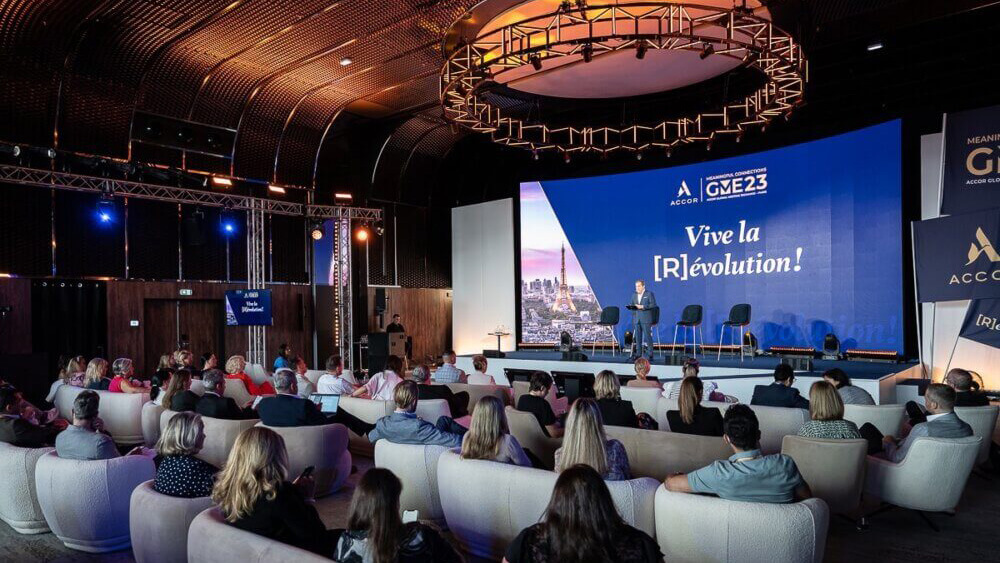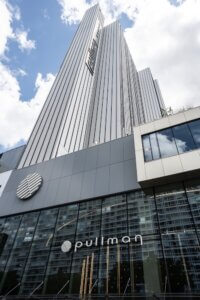
Accor hosts the GME annually, bringing together leadership and representatives from its more than 40 hotel brands with meeting planners, journalists, and other industry professionals.
In the 38 years STR has tracked hotel performance data, the past four “have been the most remarkable,” said Robin Rossman, managing director of STR, in a presentation that kicked off Accor’s Global Meeting Exchange (GME), held July 17-20 in Paris. It showed that since 2020, travel has rebounded in spurts, mostly led by leisure travelers in search of wellness and luxury escapes close to home. But this year, he said, hotel performance data revealed that demand from travel for meetings and business is back in a big way. And according to Accor’s recent global business travel survey of corporate clients, 57 percent of respondents expect travel budget to increase in 2024 compared to 2023.
The needs, wants, and expectations of travelers, however, have shifted, and hospitality companies like Accor are shifting in turn to meet them through products and experiences that emphasize work-life balance, wellness, and sustainability. That was the overarching takeaway from this year’s GME, Accor’s annual gathering for leadership, clients, and global events industry trade media (Convene was hosted by Accor), which, in addition to providing updates and news from the world’s sixth-largest hospitality company, offered insights from industry leaders and experts on how these trends are reshaping the future of hospitality, travel, and events.

The 957-room Pullman Paris Montparnasse, host of Accor’s 2023 Global Meeting Exchange, is the new flagship property of the revamped Pullman brand, which represents Accor’s increased focus on meetings hotels.
Rethinking MICE
One of the biggest trends to dominate the GME’s sessions should come as no surprise — bleisure. According to a recent report from Allied Market Research, the value of the bleisure travel industry is expected to more than double in a decade, hitting $731.4 billion by 2032. The report cites such contributing factors as a greater pusher toward work-life balance and remote work as well as increasing demand from Millennial-age travelers. Over the past year and a half, Accor has focused on revamping one of its oldest brands, Pullman Hotels & Resorts, into what it envisions as a modern-day business hotel — a big reason why Accor chose to host the GME at the Pullman Paris Montparnasse in Paris this year.
“We’re really at a turning point, moving away from ‘work hard, play hard’,” said Kishan Chandnani, global senior vice president, premium brands, at Accor. “As we were thinking about the future of experiences, how do we blend work and life?” Creating non-siloed spaces is one way — like the new multifunctional C2 Immersive Space at the Pullman Paris Montparnasse. GME attendees had a chance to experience the space, which is designed to host everything from fashion shows to trade shows, during their customer appointments.
The C2 Immersive Space is a new prototype for Accor, he added, one that moves away from the traditional, static boardroom to an event space that is “truly transformative and creative” and designed for “immersive, entertainment-focused events, which is what our clients are asking for.” Currently, there are close to 150 Pullman properties in Accor’s global portfolio, mostly within the APAC and EMEA regions — but expect to see more in the pipeline, including North America, as Accor has an aggressive plan to grow the brand by 20 to 30 new properties annually. “We’re rethinking MICE,” Chandnani said. “I don’t think anyone globally from a hotel perspective has really been able to capture what MICE is able to do, for tomorrow. We have a real opportunity there.”

Attendees could try out ReLounge’s therapeutic loungers, which aim to relieve back pain, at the GME’s on-site Wellbeing Garden.
An emphasis on wellness
Wellness emerged as another major theme, as both an experience and guiding principle for the future of hotel and event design. During the “Hotels of the Future” session, Alex Schellenberger, CMO, premium, midscale and economy brands for Accor, emphasized that the hospitality industry “needs a better answer to bleisure,” and part of that requires taking a more holistic approach to how we gather. “There is a space for much softer productivity now,” he said, “demanding more balanced, blended spaces.”
On site, Accor answered that call with a Wellbeing Garden, a spa-inspired space where GME attendees could easily escape between meetings and sessions to wind down with the latest therapies and treatments, from stress-relieving headsets playing binaural beats to back pain-reducing massage chairs to consultations on CBD treatments. Accor’s Emlyn Brown, global senior vice president of wellbeing, has reprised the Wellbeing Garden at industry events several times now and believes activations like these can result in more authentic social interactions as well as serve to make events more appealing to Gen Z audiences. “Four out of five of our guests, irrespective of age, demographics, or country, are taking a daily step to improve their wellbeing,” said Brown in Accor’s new Business of Travel report, released this week. “So we need to meet and exceed that demand in all our brands, no matter which brand travelers are choosing.”
Bruno Marti, executive VP of brand marketing for Accor’s lifestyle hospitality collective, Ennismore, which includes boutique brands like The Hoxton and SO/, echoed his sentiments, saying the Wellbeing Garden is a way to “bring MICE into the spa and bring the spa into MICE.”

Day one of the GME in Paris ended with an evening cruise down the Seine. This year was the first that Accor chose to host the annual event in its hometown of Paris.
Making an Impact
This year was the first Accor choose to host its annual GME in its hometown, which enabled the company to showcase its new Pullman flagship hotel and put a spotlight on the city and its evolving event capabilities. Those will be on full display come fall when Paris will host the 2023 Rugby World Cup, which is expected to break attendance records, and next summer during the 2024 Summer Olympics.
During GME’s panel, “The Future of Events and Travel,” leadership from Accor, Air France, and the Paris 2024 organizing committee spoke about the climate impact of hospitality and air travel, and what the collective industry can do to mitigate that impact. The Paris 2024 organizing committee has set out to produce the most sustainable version of the Olympics yet, aligning with the Paris Agreement to achieve carbon neutrality by cutting the event’s greenhouse gas emissions in half and offsetting the rest, among other goals. This is on top of local efforts, like the city-led project to clean up the Seine.
Meanwhile, Accor — an official partner of the 2024 Olympics — has set similar goals, including reducing its carbon emissions by 46 percent by 2030, and reaching net-zero emissions by 2050. “For us,” said Valérie de Robillard, Accor’s senior vice president, environment & CSO coordination sustainability, “it’s not about having a sustainability strategy — rather, it’s about making Accor’s strategy sustainable. We need to transform each and every aspect of how we do business.”
More and more often, she said, MICE clients are asking Accor to align with their own sustainability goals and targets in their RFPs. In response, de Robillard shared, Accor has made changes, like asking property owners to adjust the temperature in hallways and lobby spaces by two to three degrees, for example. Food and beverage, which makes up 11 percent of their carbon footprint, is another major focus — specifically by reducing reliance on more carbon-intensive ingredients like beef as well as eliminating food waste. At the Pullman Paris Montparnasse, staff have installed a biowaste collector that turns food waste into biogas energy, while leftover food fit for consumption is donated to a local food bank. In addition, Accor has tapped Winnow’s AI technology to reduce food waste. Across all its brands, Accor hopes to reduce its F&B waste by 60 percent by 2025.
For a full recap of the Accor’s 2023 GME, check out the upcoming September/October issue of Convene. For day-by-day highlights, check out the Accor GME story on Convene‘s Instagram.
Jennifer Dienst is senior editor at Convene.
